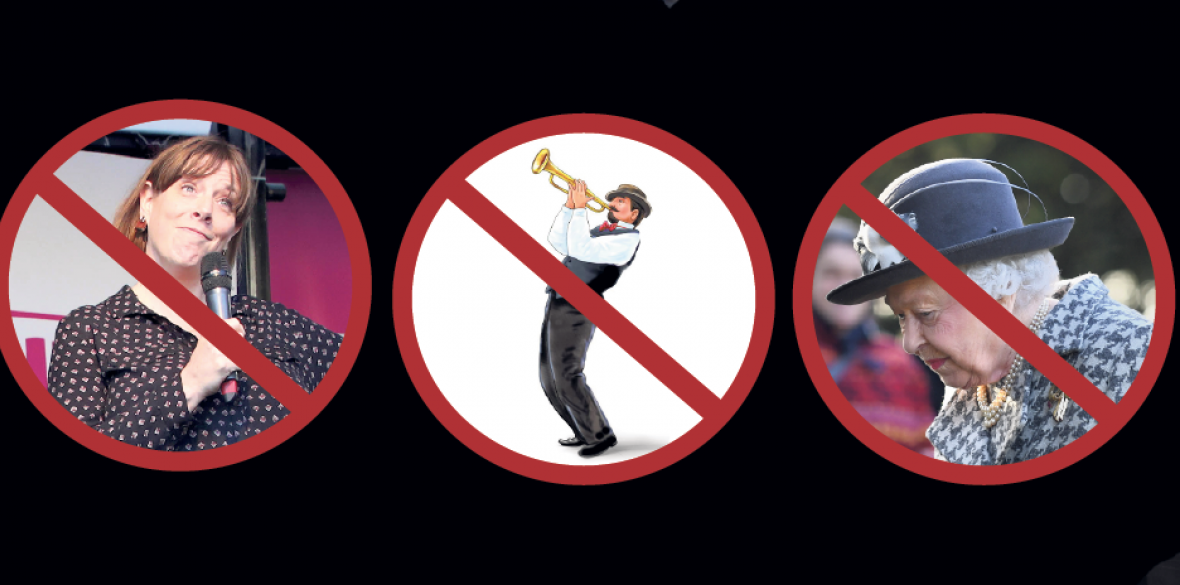This is the last article you can read this month
You can read more article this month
You can read more articles this month
Sorry your limit is up for this month
Reset on:
Please help support the Morning Star by subscribing here
THIS has been a good couple of weeks for the art of saying “no.” We begin of course with Megxit. Like you, I initially found this term quite annoying. And yet it has grown on me, as I have come to understand the similarities between Harry and Meghan’s refusal to honour their royal obligations, and Britain’s departure from the European Union.
Neither process has exactly been a victory for progressive forces. And yet both have disrupted an established instrument of class rule. And perhaps most importantly, both have sparked joy by provoking such audible grief amongst so many very irritating people.
In the case of Megxit, it is the aggressively miserable wing of British society who are up in arms. These are the sort of people who leave bad reviews on Trip Advisor, and who have opinions on whether other people are dressed smartly enough. They consider a permanent fancy dress pageant to be part of their birthright, and they are quite deliciously irked by Harry’s refusal to carry on participating in it.
Yet it is not an ex-royal, but instead two commoners, who in fact deserve the greatest accolade for the recent services to the word “no.” Specifically, it is Dawn Butler and Richard Burgon who are now taking a lot of flak for refusing to sign up to the ten pledges put forward by the Board of Deputies.
The pledges — to which almost every other candidate has unfortunately put their name — effectively demand the end of Labour as an autonomous political party. It is demanded that Labour gets in an “external provider” to handle complaints of anti-semitism. It is also demanded that Labour suspends anyone who supports anyone who is suspended by such a body. This could well mean a situation in which an MP is elected on a Labour ticket, and is then kicked out of the party by an external organisation, along with anyone who questions the basis on which they were kicked out.
Yet the most offensive demand concerns which Jews the Labour Party is allowed to engage with. Candidates have been asked to pledge that Labour would “engage with the Jewish community via its main representative groups and not through fringe groups and individuals.”
As Richard Burgon rightly put it, the voices of minorities within minorities also need to be heard. We as Jews have the right to engage with Labour as Jews, regardless of whether bodies like the BoD represent our views or interests.
Saying no to unreasonable people can be a bit of a lottery. On the one hand a lot of stuff might get thrown at you. On the other hand, unreasonable people often respond quite unattractively when faced with non-cooperation — to the extent that they sometimes find themselves on far shakier reputational ground.
I suspect this may be how things turn out with the BoD president Marie van der Zyl, who threw quite a tantrum in response to Burgon and Butler’s refusal to play along. Her assertion that Butler and Burgon were themselves exemplary of Labour’s problem with “institutional anti-semitism” will look to a lot of people like an attempt to bully people into agreeing with her — and will raise questions about her ability to use this term in a way that makes any sense whatsoever.
Sadly not all of our opponents are knocked sideways by encountering disagreement. In the case of Jess Phillips what is striking is her truly peculiar degree of resilience to being told no. Faced with mounting evidence that very few people want her as Labour leader, she has declared in a piece for the Guardian that the problem is not Jess Phillips — but is in fact the leadership election. In particular she felt that Saturday’s hustings, in which she fared very badly, were a highly questionable “test of leadership.”
There was, she suggested, a gulf between “the political leadership people look for,” and the kind they “should” look for. Real leadership, she writes, is a matter of “deeds not words.” Which, it must be said, is quite an interesting pivot for somebody who has spent most of the last four years making statements about how she states things, and presenting her alleged capacity for “straight-talking” as her chief political attribute.
The theory that Jess Phillips is awesome is, in a sense, unfalsifiable. If she was powering ahead in the polls, it would be evidence that that her plain-speaking Brumminess cuts through with salt-of-the-earth door-knockers in a way that olive-eating Trotskyists can’t comprehend. As it is, her failure to win much support reflects the deficits of the electoral process, and its insensitivity to proper leadership qualities.
Over the next few years we’re going to have to say “no” rather a lot, as we deal with anti-trade union laws from Boris Johnson, bright ideas from Dominic Cummings, and, if we’re really unlucky, friends who want to take us to jazz concerts. If you’re as crap as me at deploying this particular two-letter word, then now is a very good time to start practising.











